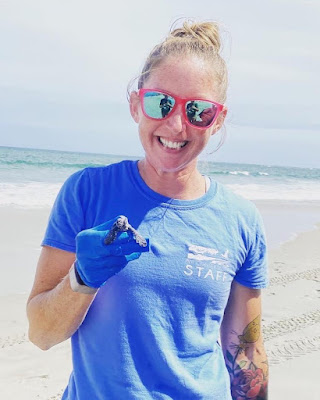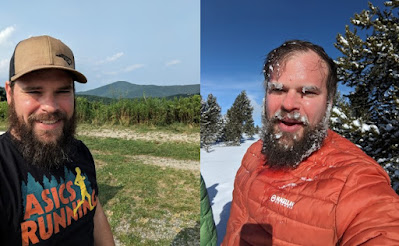Trish Reed, a former middle school science teacher who has an “encore” post-retirement career as an interpretive park guide with Grandfather Mountain Stewardship Foundation, recently completed her NC Environmental Education Certification. Trish develops and presents a variety of informal and formal programs that educate participants about Grandfather Mountain State Park’s ecological value and its unique flora, fauna, weather, geology and geography.
Trish says her favorite part of the certification program
was networking with other educators. “I enjoyed meeting face-to-face a variety
of fellow environmental educators including rangers, naturalists, educators,
and volunteers who are so passionate and dedicated to their role in educating
people about their specific forest, park, reserve, or science center. Everyone
I met was highly invested in conserving, preserving and promoting their natural
workplace in a positive and enthusiastic manner.”
When asked about an experience that stood out to her Trish
says her most memorable experience was her visit to Pocosin Lakes National Wildlife
Refuge in eastern North Carolina. “The conservation work being done there by
both staff members and volunteers is impressive and demanding. We were given a tour
of the refuge by a delightful, knowledgeable, and dedicated volunteer ranger
who drove us throughout the reserve. He pointed out the best locations to view
the variety of wintering waterfowl. We had the rare opportunity to witness a
murmuration, (a new word for me!), where thousands of tundra swans were flying
together in a whirling, ever-changing direction and pattern for half an hour.
It was an awe-inspiring moment for me. We also had the rare privilege to see a
red wolf in the wild and wandering through the preserve. These were amazing
first-time experiences for me that I will always remember.”
For her community partnership project, Trish developed two
programs for the residential community where she lives in western North
Carolina. “The first program, Living Wild and Wise focused on how
our community can live safely with the native wildlife including bears,
racoons, foxes, snakes, etc. The second program, What's the Buzz?
Native Plants and Pollinators educated residents as to the reasons
that invasive plants can harm native gardens and how residents can easily add
native plants to their gardens that will also support local insects. Program
participants learned about the importance of native wildlife and plants, and
how they can support them by making small, easy lifestyle changes at home.”
Trish says the program changed the way she approached teaching. “Participating in the certification program has led me to realize that if we want to educate and effect positive environmental change using the tools of environmental education, it will require a patient, persistent, and gentle approach to influence people's ingrained opinions and lifestyles. I continue to calmly and patiently educate visitors about positive behaviors that will best support our conservation efforts at the nature park where I work. For example, I respectfully remind guests not to pick flowers, stay on designated trails, don't squash insects because you fear them, etc. I've come to realize that some visitors view our nature park more as an amusement park, so they treat it with less respect than it deserves. My goal is to continue to help them understand that these beautiful, yet limited resources, are for everyone to enjoy and participate in the stewardship of this beautiful conservation park.
When asked if the program changed the way she thinks about
environmental issues, Trish says it showed her the importance of environmental
education. “Participating in the certification program has made me realize the
vital importance of environmental education in the U.S., and the need for a
professional certification to ensure that the field has talented and highly
trained educators to support and promote it. I've come to understand that many
people, whether they come from rural, suburban, or urban areas have a
superficial understanding of and appreciation of nature, and the urgent need to
support it through preservation and conservation as our nation continues to
develop and exploit our limited resources. I believe that our role as
environmental educators is important now and is crucial for future generations.
As Baba Dioum said, ‘In the end we will conserve only what we love, we will
love only what we understand, and we will understand only what we are taught.’
My role is to teach.”























